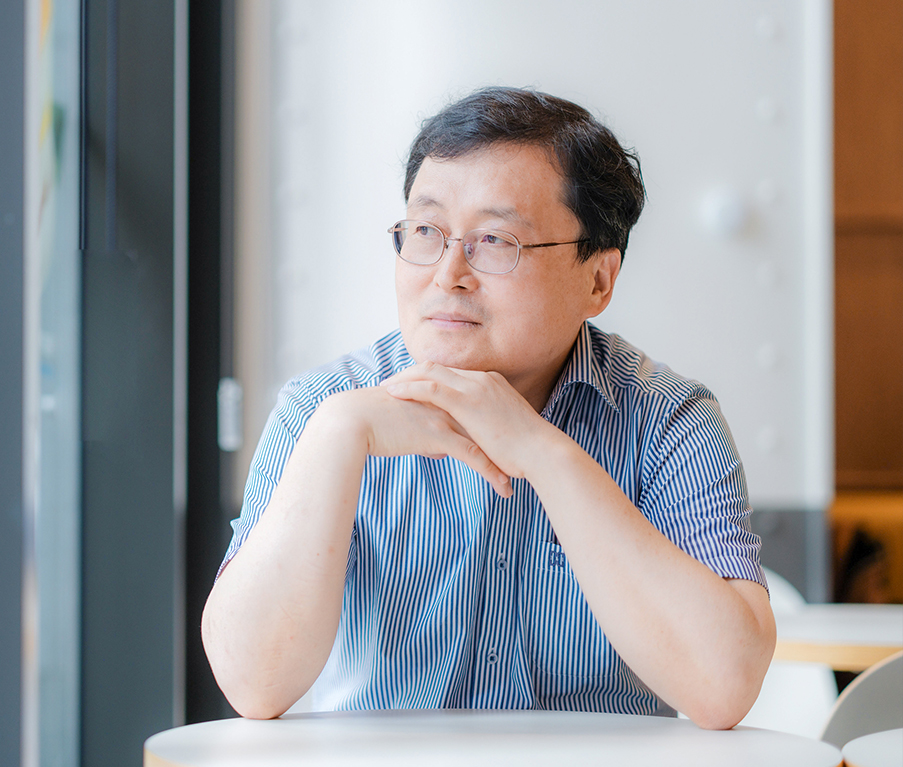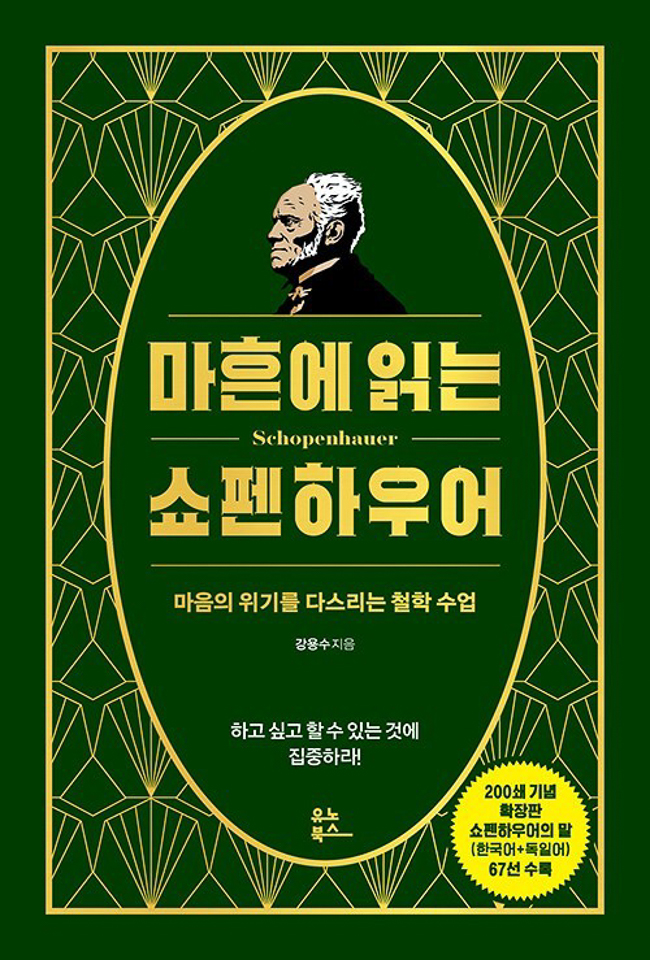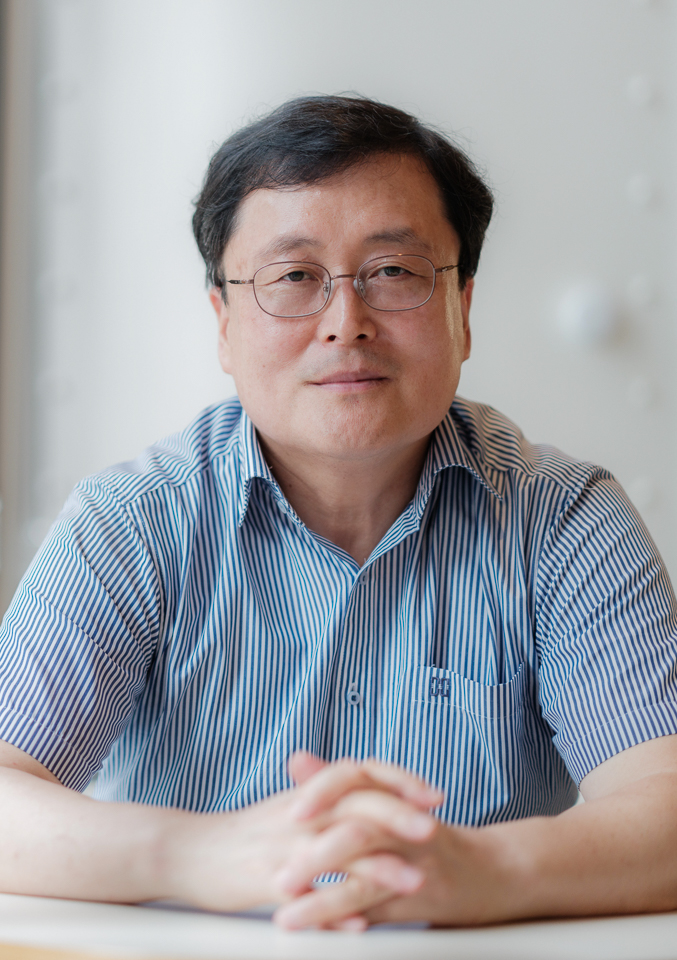- writing date 2024.10.02
- author Communication Team
- hits 5
Professor Yong Soo Kang (Philosophy, ‘86)
The author of Schopenhauer for Those in Their Forties,
the first book of philosophy
as the #1 Bestseller in all major bookstores


The Cover of Schopenhauer for Those in Their Forties (UKnowBooks, 2023)
An Unexpected Stroke of Luck
My book, Schopenhauer for Those in Their Forties, published in the fall of 2023, discusses how to live happily. In philosophy, happiness is not a particularly popular topic. But within a year since its publication, the book's explosive popularity has led to the release of an expanded edition commemorative of its 200th printing -- something I never anticipated. It still feels like a dream.
This book originated in the "Homo Beatus" (Happy Human) project, a three-year endeavor undertaken from December 2014 to November 2017 at the Institute of Philosophy Studies at Korea University. Professor Sangmu Oh first proposed the idea of exploring well-being, and several researchers, including Professors Lee Chan and Sung Changwon, partook in defining and researching the topic. At the time, I was skeptical about the proposal for collaborative research on happiness, as it seemed too commonplace a subject. I certainly couldn't have imagined that the resulting paper would be transformed into a popular book and achieve such great success. It was a windfall from an unexpected source.
Does Happiness Exist Objectively?
People tend to be overly pessimistic or optimistic about the future, which hasn't arrived yet, but it's wrong to prejudge the future. For instance, we often determine happiness to be the goal of life and strive diligently to achieve it. We anticipate our future as “ending up” being either happy or unhappy. However, in reality, we often find happiness along the way, and not at an endpoint. Is happiness the goal of life, or is it the process and outcome of life? Do we eat to live, or do we live as we eat? Schopenhauer's view aligns with the latter perspective. We consume food due to the desire to eat, and the result can be either happiness (digestion) or unhappiness (stomachache). We don't eat with the primary intention of becoming happy because the outcome is unpredictable.
When we pursue happiness, we expect there to be universally recognized conditions for it to come about, such as social success and advancement as well as the achievement of political/social power. This kind of happiness mostly exists externally. From Aristotle's perspective, honor and wealth correspond to the acquisition of external goods. A happy life is often considered to be constituted by how others evaluate us and what we possess. Rising in social status pertains to the former, while hitting the jackpot and becoming suddenly rich are related to the latter. Looking at the educational landscape in our country, talented individuals flock to fields where they can simultaneously attain both honor and wealth.
However, the dream of having external goods becomes tedious the moment it's achieved. By contrast, failure to do so leads to frustration. To use Schopenhauer's 'pendulum' analogy, human desires oscillate between the extremes of deficiency and excess. In this pendulum motion, both hunger and overeating are forms of suffering. Being perpetually isolated is lonely, but having too many people around is tiring. Lacking money is hard, but having too much of it leads to boredom resulting from having nothing to struggle for.
The Relationship Between Intellect and Happiness
Schopenhauer believes that happiness depends more on subjective conditions than objective ones. Not only does the world appear differently based on individual perspectives, but it's also shaped by one's personality. Being intelligent doesn't necessarily lead to greater happiness. As intellect develops, thoughts about the past and future accumulate, potentially leading to unhappiness. Animals with less developed intelligence live contentedly in the present, while humans with higher intelligence live with worries, constantly concerned about the past and future. Paradoxically, intelligent humans are often unhappier than unintelligent animals. We reminisce about good times in the past, get hurt by bad experiences, harbor great hopes for the future, and also feel anxious about potential tragedies. The more we think, the greater our suffering becomes. We get caught up in the past and future, neglecting the value of the most important moment: the present.
Schopenhauer emphasizes the need to enjoy the present, which will never come again. Humans exist on a continuum of time, flowing from the past through the present into the future. Happiness isn't predetermined; it's something we decide to create on this journey. Therefore, attempting to prejudge the unknown future is foolish. It seems wiser to refrain from making assessments about the future that awaits us.
Everyone's Happiness is Different
The key conditions for happiness already reside within us, so there's no need to search for them externally. According to Schopenhauer, individuality is the most important condition for happiness. Individuality is well-expressed when what we truly desire aligns with what we are truly capable of. We don't need to conform to standards set by others. There's no hierarchy or ranking in relation to individuality. How can we live a life informed by our own individuality? To some extent, we're already living in our own ways. However, in many cases, as we live alongside others, we adapt to their attitudes, being mindful of their opinions and reluctantly doing things we dislike.
Aligning desires and abilities requires a lot of trial and error. This is because we can't know from the outset what we truly want and what we're capable of. It takes time and experience to discover our unique individuality. Through the pain of failure, we eventually find what only we can do in this world. Schopenhauer suggests that we come to understand who we are around the age of 70. According to him, the first 40 years of life and the next 30 can be likened to the main text and the commentary on it, respectively. In other words, we need to reflect and introspect upon our first 40 years for the next 30 years. If it is true that we can only truly see ourselves in this world after reaching 70, then it would be the most foolish thing to commit suicide out of the belief that one has realized the meaninglessness of life early on.
Life is a Voyage
We are like a ship constantly tossed about by waves on a vast sea. As we navigate the currents of life, we may fall or rise again. Just as a ship needs heavy ballast to withstand the rocking, the human mind also needs an appropriate weight of worries and suffering. A light ship without any cargo loses stability and sways even when surrounded by small waves. Similarly, a person without any worries can be easily discouraged by minor setbacks. However, too much weight can lead to sinking, so we must always maintain only an appropriate level of suffering.
Life is a voyage, so we can't avoid the waves that roil us. Circumstances change like the ever-shifting weather, so we shouldn't hold a fixed perspective. Instead of waiting for the waves to calm, we must learn to adapt flexibly to their movements.
Nobody Knows Tomorrow

Professor Yong Soo Kang
Professor Kang majored in Western philosophy (BA & MA) at Korea University and received his Ph.D. from the University of Würzburg in Germany. He teaches methods for self-affirmation and happiness based on the philosophies of Schopenhauer and Nietzsche. His publications include: Reconstruction of Nietzsche’s Works, Reading Nietzsche’s On the Genealogy of Morality, Nietzsche’s Kulturphilosophie and Schopenhauer's Story of the Will.
The gist of Schopenhauer's pessimistic philosophy is to enjoy and live in the present. This is a misguided attempt to eliminate anxiety and a hasty judgment about the future. For Schopenhauer, who experienced significant failure in his 40s, the future was a fearful time he wanted to turn his eyes from. However, considering the great luck, happiness, fame and wealth that came to him later in life, his advice to focus solely on the present seems flawed. Buzzwords widely used by younger generations, such as “Hell Jeseon” (a pejorative term referring to Korea based on pessimistic views on the future of the nation) and “I-saeng-mang” (a portmanteau of abbreviated words meaning “this life is already ruined”) resonate with Schopenhauer's sentiment. Indulging in such despair and enjoying only today might cause us to miss unexpected opportunities that could arise in the future.
Nietzsche points out that the path praised by others as 'good' is not necessarily our true path, but is likely someone else's path. We yearn to follow the well-trodden paths laid out by others, those that seem to guarantee success, money, and happiness, but reality doesn't always cooperate with us. Our lives are unpredictable.
When I wrote Schopenhauer for Those in Their Forties, I was worried that it might be financially unsuccessful. Yet, contrary to expectations, it became a huge success. The prevailing notion that one can't make money from books is simply a prejudice. Just as Schopenhauer's assessment of the future was wrong, my predictions from a year ago were completely off the mark. In these ever-changing days, we need the wisdom not to predetermine the goal of life in order to live happily. We shouldn't assume that there's anything fixed or unchanging in this world. Both the world and ourselves are constantly changing. While settled people stay in one place, nomads are constantly on the move. Our lives are similar. If we focus on a single path, it becomes difficult to recover from setbacks. There isn't just one purpose in life. There are thousands of paths, and as we keep moving forward, we may discover new ones even when we're lost. Nobody knows whether the future holds happiness or unhappiness. Even if things don’t look as bright as we expect them to be, there's always room for small upturns in our fortunes. We must remain open to the future and to the possibilities of luck finding us as we go along.